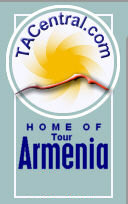|
UNCHARTED TERRITORY
The World Bank in particular has pushed programs that look suspiciously like those which crippled developing economies in Africa and South America, and which led to an overhaul of World Bank policy.
Tour Armenia
Updated 2026
What was never known, and is still unknown, is the actual value of the economy, or Gross Domestic Product. Not willing to declare real worth in the Soviet period for fear of reprisals, Armenians are notorious for never letting anyone know how much they are worth. The Sev Shuka (literally 'black market') that sprang up in the early 1990's has made the greatest difficulties for economists and tax collectors. They are beginning to settle on 4 billion dollars annual income for the country, as opposed to the government's 350 million (which only represented the amount they could actually find). Even in the worst of times (and they were brutal, with electricity cut to an hour or so day during some of the worst winters on record, and people having to fight in mobs to get state-subsidized goods), the economy grew as liberalization policies took effect. The economy was further bolstered by Humanitarian Aid efforts that pumped more than 400 million dollars annually into the economy through in-kind aid, and by Diaspora Armenians sending remittances to families in the republic.
The government's economic reform program has placed emphasis on liberalization, stabilization, and economic restructuring. Most agricultural land was privatized shortly after independence, and privatization in other sectors is moving ahead. Price control applied only to a limited number of essential goods and services, and is being phased out.
On the macroeconomics side, the stabilization policy became a government priority, given the challenge of a difficult budgetary position combined with the need to reduce inflationary pressures and maintain exchange rate stability. It achieved some success in its stabilization efforts, recently bringing the monthly inflation rate down to single digits from the triple-digit level prevailing at the end of 1993.
At the same time, macroeconomic focus has had its limiting effects on economic growth. Driven by the World Bank and the IMF (International Monetary Fund), which hold Armenia to spending restrictions more severe than those in the USA or Western Europe, actual investment in the country has been far below expectations. The World Bank in particular has pushed programs that look suspiciously like those which crippled developing economies in Africa and South America, and which led to an overhaul of World Bank policy. A WB driven plan to provide guarantees for loans to the national air carrier failed, damaging Armenia's credibility with international investors, and a new plan to privatize the health care system has the potential to shut out the most needy from medical help.
World Bank Armenia Report
IMF Armenia Report
WFP Hunger Report Armenia
UNDP
Interfax: Armenia
CIA Factbook: Armenia
 Top
Top
 Back
Back

|



